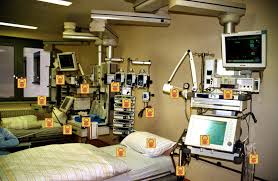
Nosocomial Infections
(This article was written in 2008)
-in short, going into a hospital with one problem and dying of something else acquired while in the facility.
British Dr. Joseph Lister (1827-1912) was criticized by peers when he advocated changing smocks and washing his hands when leaving an autopsy to deliver a baby. But childbirth deaths dropped when doctors took his advice. The old way brought diseases from the morgue into the delivery room. Nosocomial infections.
Nosocomial infections cost lives and dollars.
Those most prone are children under 2 years-old and seniors over 70.
About 100,000 deaths per year, says the CDC.
I was once an Operations Manager for an Environmental Services department in a 250-bed hospital.
Here are a few items to consider:
1) Housekeepers or EVS techs (Environmental Service Technicians) may go into an occupied room and ask the patient if they want their room cleaned today.
Always say yes. EVS techs should never be allowed to ask that question. Every occupied room should be cleaned every day.
A hospital is an environment, and no room is completely separate from the other rooms.
Rooms that aren’t cleaned become fermentation vats for germs and viruses.
Some cleaners also check scheduled discharges and not clean those rooms. What if a discharge is delayed?
And some patients refuse room cleaning. This should be reported by tech to their management.
2) The rooms of long-term patients are the worst. The bed is often the most infected part of the room and the hardest to clean.
Patients should have their beds swapped out ,so they get a sanitized bed every ‘x’ days to lesser the number of germs that attending staff can transfer to the patient in the next room.
3) If practical, rooms should be cleaned daily from least infectious to most infectious. It makes sense. At the least, Isolation Rooms should be cleaned last, yet daily.
4) EVS employee turnover rates are high, everywhere, yet it takes 3-6 weeks to hire new EVT staff, because of background checks.
Even so hospitals hesitate to pad the FTE account to compensate for inevitable churn in the department.
This reluctance = nosocomial infections. And when this shortage exists, workers can sense it, and some begin to manage their own workloads.
This downgrades room quality and safety.
5) EVS training is often incomplete and abbreviated.
Professional, dedicated trainers should be used. And the trainer should not be counted as an FTE for employee workload count.
6) ‘Isolation Room’ Is the term used for a room that a highly contagious patient inhabits.
When the patient leaves, special cleaning is necessary to keep the next patient and personnel from being infected.
In the hospital where I worked, Nurses, not EVS Techs, removed isolation signage and equipment. If this removal was done between shifts,
then the next shift might go unwarned into an infected room and acquire especially potent germs, and carry those germs into other rooms.
I worked to track Isolation Rooms more effectively.
7) Some hospitals expect EVS techs to offer to refill patient coffee cups or water glasses. NO!
They need to spend their time creating healthy rooms for paitients.
8) I do not drink out of hospital water fountains, but will drink their brewed coffee in waiting areas.
***********
There is another disturbing side to this issue. Insurance companes will not pay charges for nosocomial infections, claiming it is the hospital's fault.
This claim has some merit to many. But there is side door.
When a patient begins to present symptoms that could be labeled as a nosocomial infection, the patient is quickly discharged,
with the decision-makers knowing full well the patient isn't ready to be dischrged by will be admitted tow or three days later,
but with new symptoms and a clean slate for insurance reimbursements.
So nosocomial deaths are actually higher than reported.
**********
Lastly, EVS work is hard work.
The crew is usually short-handed. They work every-other weekend and half of the holidays each year.
The work deals with all body fluids, contaminated needles, and occasionally cranky patients and demanding schedules.
It’s a tough life.
Appreciate the good ones, but if you feel you need to ask a question, ask for the EVS manager, unless other contact info is provided
The Environmental Services department too, has a chain-of-command, and the nurse on duty is not the EVS tech’s boss.
Eric J. Rose